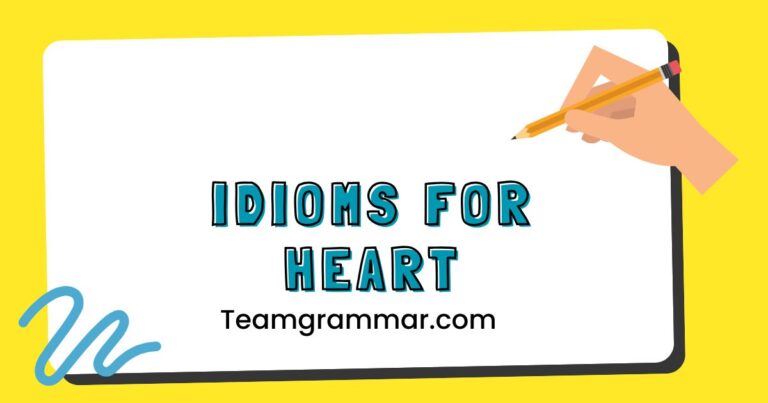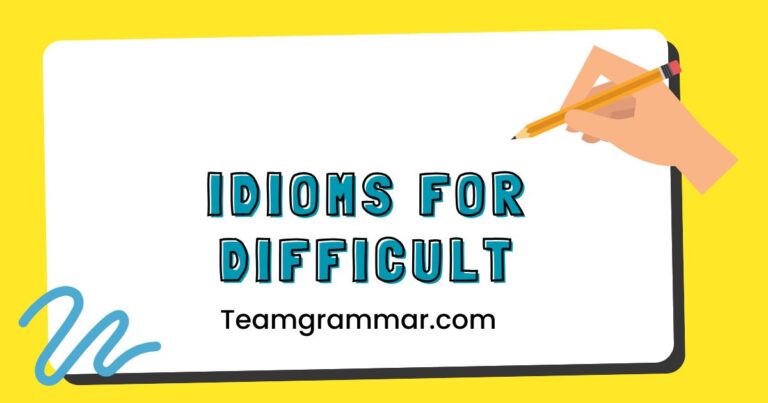31 Mastering Idioms: A Comprehensive Guide for Learners
Idioms are the spice of the English language, adding color, depth, and nuance to communication. Understanding idioms is crucial for English language learners because they frequently appear in both spoken and written English.
Without a grasp of idioms, learners may misinterpret the intended meaning, leading to confusion and miscommunication. This guide provides a comprehensive overview of idioms, focusing on their definition, structure, types, and usage, along with practical examples and exercises to help you master this essential aspect of English.
This article caters to English language learners of all levels, from beginners to advanced speakers. Whether you’re preparing for an English proficiency exam, aiming to improve your conversational skills, or simply seeking to enhance your understanding of English, this guide will equip you with the knowledge and tools necessary to confidently navigate the world of idioms.
Learning idioms will not only improve your comprehension but also enable you to express yourself more naturally and effectively.
Table of Contents
- Definition of Idioms
- Structural Breakdown of Idioms
- Types and Categories of Idioms
- Examples of Idioms
- Usage Rules for Idioms
- Common Mistakes with Idioms
- Practice Exercises
- Advanced Topics in Idioms
- Frequently Asked Questions (FAQ)
- Conclusion
Definition of Idioms
An idiom is a phrase or expression whose meaning cannot be understood from the literal meanings of its individual words. In other words, the meaning of the entire phrase is different from the combined meanings of the words it contains.
Idioms are deeply rooted in culture and history, often reflecting specific experiences, traditions, or beliefs of a particular language community.
Idioms can be classified based on their grammatical structure and the types of words they contain. Some common classifications include phrasal verbs, metaphorical expressions, and sayings.
Their function in language is to add color, emphasis, and nuance to communication. They are used to express ideas in a more vivid, concise, or humorous way than would be possible with literal language.
The contexts in which idioms are used vary widely. They are common in everyday conversation, literature, journalism, and even academic writing (though less frequently).
Understanding the context is crucial for interpreting the meaning of an idiom correctly. Because idioms are culture-specific, their meanings can be challenging for non-native speakers to grasp without explicit instruction and exposure.
Structural Breakdown of Idioms
The structure of idioms can vary greatly, ranging from simple two-word phrases to complex sentences. Understanding the structural elements of idioms can help learners recognize and interpret them more effectively.
Many idioms follow common grammatical patterns, even though their meanings are non-literal.
Common patterns include:
- Phrasal verbs: These consist of a verb and a preposition or adverb (e.g., give up, look after). The combination creates a new meaning different from the individual words.
- Prepositional phrases: These involve a preposition and a noun or pronoun (e.g., in a nutshell, by the skin of your teeth).
- Similes and metaphors: These use comparison to convey meaning (e.g., as cool as a cucumber, a heart of gold).
- Fixed expressions: These are phrases with a set word order that cannot be changed without altering the meaning (e.g., spill the beans, bite the bullet).
The grammatical structure of an idiom often provides clues about its function and usage. For example, idioms that are phrasal verbs often function as verbs in a sentence, while idioms that are prepositional phrases often function as adverbs or adjectives.
Types and Categories of Idioms
Idioms can be categorized in several ways, based on their meaning, structure, or origin. Here are some common categories:
1. Phrasal Verbs
Phrasal verbs are idioms that consist of a verb and a preposition or adverb. The combination creates a new meaning that is different from the literal meanings of the individual words.
For example, “look up” means to search for information, not simply to look in an upward direction.
2. Metaphorical Idioms
Metaphorical idioms use figurative language to convey meaning. They often involve comparisons or analogies that are not literally true.
For example, “break the ice” means to make people feel more comfortable, not to physically break ice.
3. Similes
Similes are idioms that use the words “like” or “as” to compare two things. The comparison is not meant to be taken literally, but rather to convey a particular quality or characteristic.
For example, “as busy as a bee” means very busy.
4. Proverbs
Proverbs are short, well-known sayings that express a general truth or piece of advice. They often reflect cultural values or beliefs.
For example, “actions speak louder than words” means that what people do is more important than what they say.
5. Euphemisms
Euphemisms are idioms that are used to soften or replace words or phrases that are considered offensive, unpleasant, or taboo. For example, “pass away” is a euphemism for die.
6. Cliches
Clichés are idioms that have become overused and lost their original impact. While they are still technically idioms, they are often considered to be unoriginal and should be used sparingly.
For example, “raining cats and dogs” is a cliché for heavy rain.
Examples of Idioms
Understanding idioms requires exposure to a wide range of examples. The following tables provide numerous examples of idioms, categorized by their type, to help you expand your vocabulary and improve your comprehension.
Table 1: Common Phrasal Verbs
This table presents a list of frequently used phrasal verbs along with their meanings and example sentences. Phrasal verbs are an essential part of everyday English conversation.
| Idiom | Meaning | Example Sentence |
|---|---|---|
| Break down | Stop functioning; become overwhelmed | The car broke down on the highway. / She broke down in tears after hearing the news. |
| Carry on | Continue | Please carry on with your work while I’m away. |
| Come across | Find unexpectedly | I came across an old photo album in the attic. |
| Get along | Have a good relationship | I get along well with my colleagues. |
| Give up | Stop trying | Don’t give up on your dreams. |
| Look after | Take care of | Can you look after my cat while I’m on vacation? |
| Look forward to | Anticipate with pleasure | I’m looking forward to my vacation. |
| Put off | Postpone | We had to put off the meeting until next week. |
| Run out of | Have no more of something | We ran out of milk this morning. |
| Take off | Leave the ground (airplane); remove clothing | The plane took off on time. / Please take off your shoes at the door. |
| Turn down | Reject an offer | He turned down the job offer. |
| Turn up | Appear unexpectedly | He turned up late for the meeting. |
| Bring up | Raise a child; introduce a topic | They brought up their children in the countryside. / Don’t bring up that topic again. |
| Call off | Cancel | They called off the baseball game due to rain. |
| Check out | Investigate; leave a hotel | I’ll check out the new restaurant. / We need to check out of the hotel by noon. |
| Figure out | Understand; solve | I can’t figure out how to solve this problem. |
| Find out | Discover | I need to find out more information. |
| Get over | Recover from | It took me a while to get over the flu. |
| Go on | Continue; happen | The show must go on. / What’s going on here? |
| Hold on | Wait | Please hold on a moment while I check. |
| Keep up with | Stay at the same pace | It’s hard to keep up with all the new technology. |
| Look up to | Admire | I look up to my older brother. |
| Make up | Invent; reconcile | He made up a story to explain his absence. / They argued, but they made up later. |
| Pass away | Die (euphemism) | Her grandfather passed away last year. |
| Pick up | Collect | I’ll pick you up at 7 pm. |
| Set up | Arrange; establish | They set up a new company. |
| Show up | Arrive | He didn’t show up for the meeting. |
| Take after | Resemble | She takes after her mother. |
| Think over | Consider | I need to think over your offer. |
| Work out | Exercise; solve | I work out at the gym three times a week. / We need to work out a solution. |
Table 2: Common Metaphorical Idioms
This table provides examples of metaphorical idioms, which use figurative language to convey meaning. These idioms often add color and expressiveness to speech and writing.
| Idiom | Meaning | Example Sentence |
|---|---|---|
| A piece of cake | Very easy | The exam was a piece of cake. |
| Break a leg | Good luck (said to performers) | Break a leg! I hope the play goes well. |
| Cost an arm and a leg | Very expensive | That car cost an arm and a leg. |
| Hit the nail on the head | Be exactly right | You hit the nail on the head with that suggestion. |
| Kill two birds with one stone | Accomplish two things at once | By studying while commuting, I kill two birds with one stone. |
| Let the cat out of the bag | Reveal a secret | He let the cat out of the bag about the surprise party. |
| Once in a blue moon | Very rarely | I only go to the movies once in a blue moon. |
| Raining cats and dogs | Raining heavily | It’s raining cats and dogs outside. |
| Spill the beans | Reveal a secret | Don’t spill the beans about the surprise. |
| Take something with a grain of salt | Not take something too seriously | Take his advice with a grain of salt. |
| The ball is in your court | It’s your turn to take action | The ball is in your court now; it’s up to you to decide. |
| Bite the bullet | Face a difficult situation with courage | I didn’t want to go to the dentist, but I had to bite the bullet. |
| Burn the midnight oil | Work late into the night | I had to burn the midnight oil to finish the project. |
| Cut corners | Do something poorly to save money or time | They cut corners on safety to save money. |
| Get something off your chest | Confess something that has been bothering you | I needed to get something off my chest and tell him how I felt. |
| Jump the gun | Act prematurely | He jumped the gun and announced the news before it was confirmed. |
| Miss the boat | Miss an opportunity | If you don’t apply now, you’ll miss the boat. |
| On the fence | Undecided | I’m still on the fence about whether to go to the party. |
| See eye to eye | Agree | We don’t always see eye to eye, but we respect each other’s opinions. |
| Steal someone’s thunder | Take credit for someone else’s accomplishment | He stole my thunder by announcing my promotion before I could. |
| Add insult to injury | Make a bad situation worse | To add insult to injury, they charged me extra for the late fee. |
| Barking up the wrong tree | Accusing the wrong person | If you think I’m the one who did it, you’re barking up the wrong tree. |
| Beat around the bush | Avoid talking about the main issue | Stop beating around the bush and tell me what you really think. |
| Best of both worlds | Enjoying two different opportunities | Working from home gives me the best of both worlds: flexibility and income. |
| Bury the hatchet | Make peace | It’s time to bury the hatchet and move on. |
| Call it a day | Stop working | I’m tired; let’s call it a day. |
| Get a taste of your own medicine | Receive the same treatment you give to others | He’s always criticizing others; it’s time he gets a taste of his own medicine. |
| Hang in there | Don’t give up | Hang in there; things will get better. |
| In the heat of the moment | Acting without thinking due to strong emotions | I said things in the heat of the moment that I didn’t mean. |
| Keep your chin up | Stay positive | Keep your chin up; everything will be alright. |
Table 3: Common Similes
This table showcases similes, which use “like” or “as” to make comparisons. Similes add vividness and clarity to descriptions.
| Idiom | Meaning | Example Sentence |
|---|---|---|
| As blind as a bat | Having very poor vision | Without my glasses, I’m as blind as a bat. |
| As brave as a lion | Very brave | He was as brave as a lion when he rescued the child. |
| As busy as a bee | Very busy | She’s been as busy as a bee preparing for the conference. |
| As cool as a cucumber | Very calm and composed | Despite the pressure, he remained as cool as a cucumber. |
| As different as night and day | Very different | Their personalities are as different as night and day. |
| As easy as pie | Very easy | The recipe is as easy as pie to follow. |
| As fit as a fiddle | In very good health | My grandfather is 90 years old but he’s as fit as a fiddle. |
| As gentle as a lamb | Very gentle | She’s as gentle as a lamb with the children. |
| As happy as a clam | Very happy | He’s as happy as a clam now that he’s retired. |
| As light as a feather | Very light | The package was as light as a feather. |
| As quiet as a mouse | Very quiet | The children were as quiet as a mouse during the movie. |
| As red as a beet | Very red (usually face due to embarrassment) | She turned as red as a beet when he complimented her. |
| As sick as a dog | Very sick | I was as sick as a dog yesterday with the flu. |
| As slow as a snail | Very slow | Traffic was as slow as a snail this morning. |
| As smooth as silk | Very smooth | Her skin is as smooth as silk. |
| As stubborn as a mule | Very stubborn | He’s as stubborn as a mule when he makes up his mind. |
| As strong as an ox | Very strong | He’s as strong as an ox from working on the farm. |
| As sweet as sugar | Very sweet | She’s as sweet as sugar to everyone she meets. |
| As tall as a giraffe | Very tall | My brother is as tall as a giraffe. |
| As white as snow | Very white | The tablecloth was as white as snow. |
| Like two peas in a pod | Very similar | They’re like two peas in a pod. |
| Like a fish out of water | Uncomfortable in a new environment | I felt like a fish out of water at the formal dinner. |
| Like riding a bike | Easy to remember how to do something | I hadn’t skied in years, but it was like riding a bike. |
| Like a needle in a haystack | Difficult to find | Finding the lost earring in the sand was like looking for a needle in a haystack. |
| Like a bull in a china shop | Clumsy | He’s like a bull in a china shop when he tries to help in the kitchen. |
| Like clockwork | Regular and predictable | The train runs like clockwork. |
| Like father, like son | Sons often resemble their fathers in character | He’s a skilled carpenter, like father, like son. |
| Like pulling teeth | Very difficult to get someone to do something | Getting him to help with the chores is like pulling teeth. |
| Like talking to a brick wall | Trying to communicate with someone who is unresponsive | Trying to argue with him is like talking to a brick wall. |
| Like two ships passing in the night | Meeting briefly and then parting ways | We’re like two ships passing in the night; we never have time to talk. |
Usage Rules for Idioms
Using idioms correctly requires understanding not only their meaning but also their grammatical function and appropriate context. Here are some key usage rules to keep in mind:
- Understand the meaning: Always ensure you know the precise meaning of an idiom before using it. Misusing an idiom can lead to confusion or miscommunication.
- Consider the context: Idioms are often informal and may not be appropriate in formal settings, such as academic writing or business presentations.
- Pay attention to grammar: Idioms often follow specific grammatical patterns. Ensure you use the correct verb tense, word order, and prepositions.
- Avoid overusing idioms: While idioms can add color to your language, using too many can make your speech sound unnatural or forced.
- Be aware of cultural differences: Some idioms are specific to certain cultures or regions. Be mindful of your audience and avoid using idioms that they may not understand.
There are exceptions to these rules. Some idioms are more versatile and can be used in a variety of contexts.
Additionally, some idioms have multiple meanings, depending on the context. For example, the idiom “break the ice” can mean to make people feel more comfortable or to start a conversation.
Common Mistakes with Idioms
Learners often make mistakes when using idioms due to a lack of understanding of their meaning, structure, or context. Here are some common mistakes to avoid:
- Literal interpretation: Interpreting an idiom literally instead of understanding its figurative meaning (e.g., thinking “raining cats and dogs” means actual animals are falling from the sky).
- Incorrect word order: Changing the word order of a fixed expression, which can alter its meaning or make it nonsensical (e.g., saying “spilling the beans” instead of “spilling the beans”).
- Wrong prepositions: Using the wrong preposition in a phrasal verb, which can change the meaning of the idiom (e.g., saying “look at” instead of “look after”).
- Misunderstanding context: Using an idiom in an inappropriate context, such as using informal idioms in formal settings.
Here are some examples of correct and incorrect usage:
| Incorrect | Correct | Explanation |
|---|---|---|
| He was feeling under the weather, literally. | He was feeling under the weather. | “Under the weather” is an idiom meaning feeling unwell; no need to interpret it literally. |
| Spilling the bean. | Spill the beans. | The idiom is “spill the beans,” not “spilling the bean.” |
| I look at my sister. | I look after my sister. | “Look after” means to take care of; “look at” simply means to direct your eyes towards. |
| The CEO told us to break a leg on the quarterly report. | The CEO wished us luck on the quarterly report. | “Break a leg” is only said to performers, not in a business context. |
Practice Exercises
Test your understanding of idioms with the following practice exercises. Each exercise includes a set of questions and their corresponding answers.
Exercise 1: Multiple Choice
Choose the correct meaning of the idiom in each sentence.
| Question | Options | Answer |
|---|---|---|
| 1. He’s always pulling my leg. | a) Helping me b) Teasing me c) Ignoring me | b) Teasing me |
| 2. She decided to call it a day. | a) Start working b) End working c) Continue working | b) End working |
| 3. The project is in the bag. | a) Unlikely to succeed b) Likely to fail c) Likely to succeed | c) Likely to succeed |
| 4. Don’t beat around the bush. | a) Be direct b) Be indirect c) Be quiet | a) Be direct |
| 5. I’m feeling a bit under the weather. | a) Feeling great b) Feeling unwell c) Feeling energetic | b) Feeling unwell |
| 6. He let the cat out of the bag. | a) Kept a secret b) Revealed a secret c) Ignored a secret | b) Revealed a secret |
| 7. That new car cost him an arm and a leg. | a) Was very cheap b) Was moderately priced c) Was very expensive | c) Was very expensive |
| 8. I had to bite the bullet and go to the dentist. | a) Avoid a task b) Face a difficult situation c) Enjoy an experience | b) Face a difficult situation |
| 9. The test was a piece of cake. | a) Very difficult b) Very easy c) Very long | b) Very easy |
| 10. It’s raining cats and dogs outside. | a) Lightly raining b) Heavily raining c) Not raining at all | b) Heavily raining |
Exercise 2: Fill in the Blanks
Complete the sentences with the correct idiom from the list below.
(List: break a leg, hit the nail on the head, kill two birds with one stone, on the fence, see eye to eye)
| Question | Answer |
|---|---|
| 1. I’m still ________ about whether to accept the job offer. | on the fence |
| 2. You ________ with your analysis of the situation. | hit the nail on the head |
| 3. By exercising at home, I ________ and save money on gym fees. | kill two birds with one stone |
| 4. ________! I hope you do well in your performance. | break a leg |
| 5. We don’t always ________, but we respect each other’s opinions. | see eye to eye |
Exercise 3: Matching
Match the idiom with its correct meaning.
| Idiom | Meaning | Answer |
|---|---|---|
| 1. Get something off your chest | a) Miss an opportunity | 1-c |
| 2. Miss the boat | b) Stop working | 2-a |
| 3. Call it a day | c) Confess something | 3-b |
| 4. Hang in there | d) Face a difficult situation | 4-e |
| 5. Bite the bullet | e) Don’t give up | 5-d |
Advanced Topics in Idioms
For advanced learners, exploring the etymology and cultural context of idioms can provide a deeper understanding of their meaning and usage. Here are some advanced topics to consider:
- Etymology of idioms: Researching the origins of idioms can reveal fascinating insights into their historical and cultural roots. For example, the idiom “raining cats and dogs” is believed to have originated in 16th-century England, when sanitation was poor and heavy rainstorms would sometimes wash dead animals through the streets.
- Cultural variations: Understanding how idioms vary across different cultures and regions can help you avoid misunderstandings and communicate more effectively. Some idioms are universal, while others are specific to certain cultures.
- Idioms in literature and film: Analyzing how idioms are used in literature and film can enhance your appreciation of these art forms and improve your understanding of the nuances of language. Authors and filmmakers often use idioms to add depth, humor, or realism to their work.
- Creating your own idioms: While it’s generally not advisable to create your own idioms (as they may not be understood by others), experimenting with language and figurative expressions can be a fun and creative way to improve your language skills.
Frequently Asked Questions (FAQ)
Here are some frequently asked questions about idioms:
- What is the difference between an idiom and a proverb?
An idiom is a phrase whose meaning is not predictable from the usual meanings of its constituent elements. A proverb is a short, popular saying that expresses a common truth or belief. While both are types of figurative language, proverbs typically offer advice or wisdom, while idioms are more general expressions.
- How can I learn idioms effectively?
The best way to learn idioms is through exposure and practice. Read widely, listen to native speakers, and pay attention to how idioms are used in context. Keep a notebook of new idioms and try to use them in your own writing and speaking.
- Are idioms the same in all languages?
No, idioms are language-specific and often reflect the culture of the language. While some idioms may have equivalents in other languages, their literal translations may not make sense. It’s important to learn idioms in each language separately.
- Can I use idioms in formal writing?
In general, it’s best to avoid using idioms in formal writing, such as academic papers or business reports. Idioms are often informal and may not be appropriate for formal settings. However, there are exceptions, and some idioms may be acceptable in certain contexts.
- How do I know when to use an idiom?
Use idioms when you want to add color, emphasis, or nuance to your language. However, be mindful of your audience and the context. Avoid using idioms that they may not understand or that may be inappropriate for the situation.
- What should I do if I don’t understand an idiom?
If you don’t understand an idiom, ask for clarification. You can ask the speaker to explain the meaning of the idiom or look it up in a dictionary or online resource. Understanding the context can also help you infer the meaning of the idiom.
- Are there any idioms that should be avoided?
Yes, some idioms may be considered offensive or insensitive, depending on the context and the audience. Avoid using idioms that are based on stereotypes or that could be hurtful to others.
- How can I practice using idioms?
There are many ways to practice using idioms. Try using them in your own writing and speaking, watch movies and TV shows, read books and articles, and listen to podcasts and music. You can also find online resources and exercises to help you practice.
- Is it important to know the origin of an idiom to use it correctly?
While knowing the origin of an idiom can be interesting and provide a deeper understanding, it is not essential for using it correctly. The most important thing is to understand the current meaning and usage of the idiom.
- How can I tell if a phrase is an idiom or just a literal expression?
If the meaning of the phrase is different from the literal meanings of the individual words, it is likely an idiom. Also, idioms often have a figurative or metaphorical meaning. If the phrase sounds familiar and is commonly used, it is also more likely to be an idiom.
Conclusion
Mastering idioms is an essential step in achieving fluency and a deeper understanding of the English language. By understanding the definition, structure, types, and usage rules of idioms, learners can significantly improve their comprehension and communication skills.
This guide has provided a comprehensive overview of idioms, along with numerous examples and practice exercises to help you on your learning journey.
Remember to continue practicing and exposing yourself to a wide range of English content to further enhance your understanding of idioms. Pay attention to how native speakers use idioms in context, and don’t be afraid to ask questions when you encounter unfamiliar expressions.
With dedication and practice, you’ll be able to confidently incorporate idioms into your own speech and writing, adding color, depth, and nuance to your communication. Good luck on your continued English learning endeavors!







